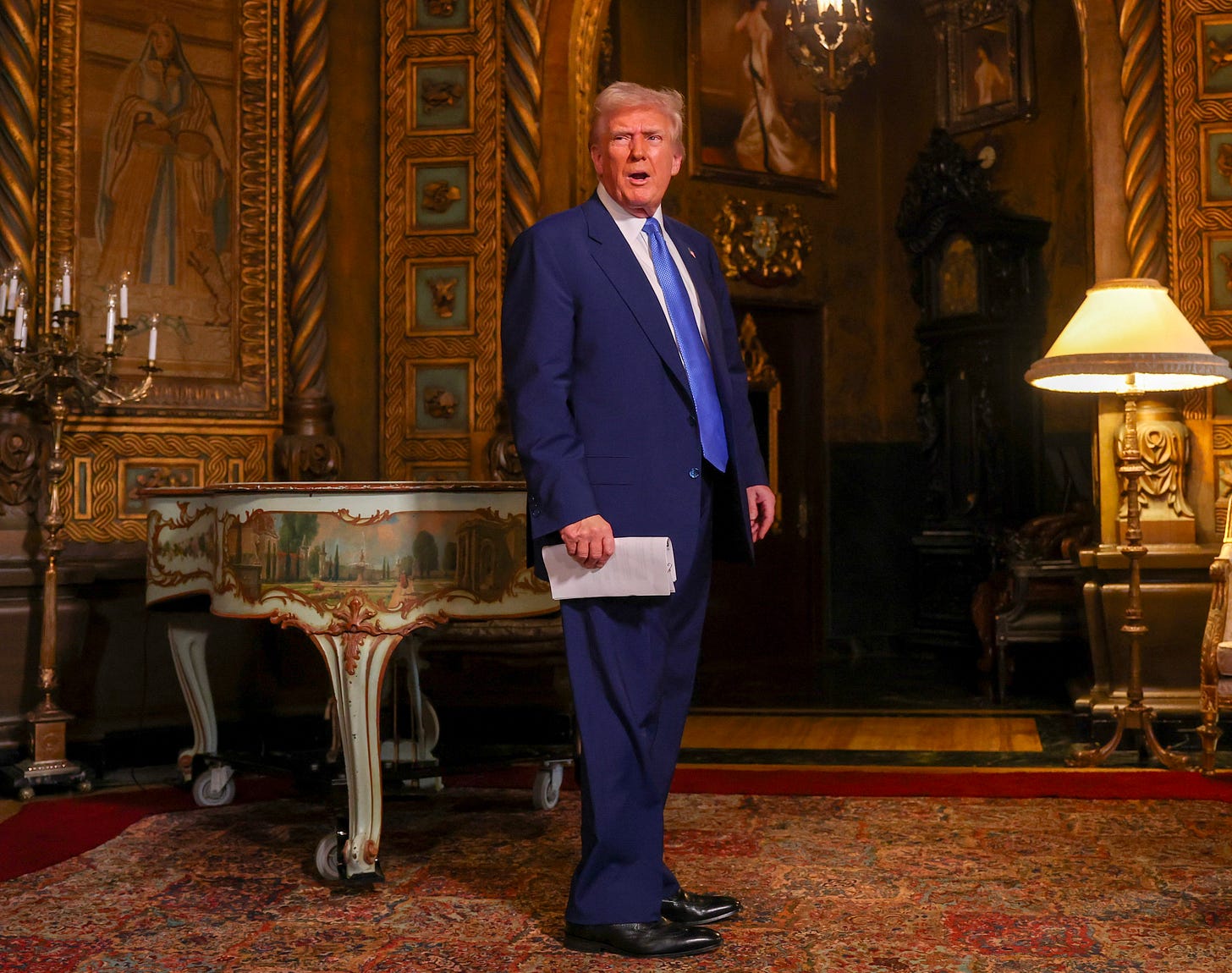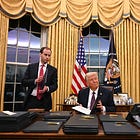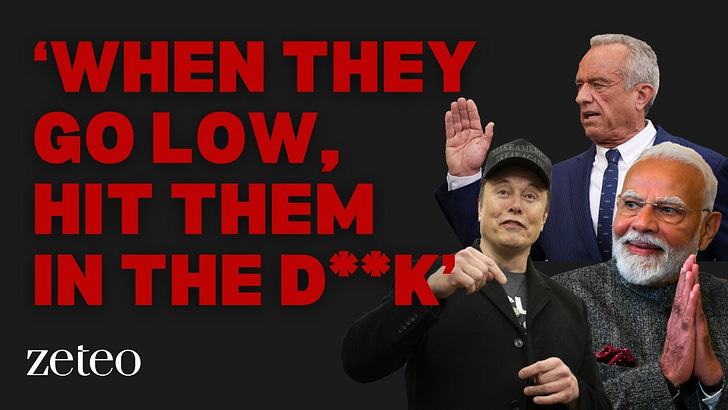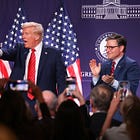Trump's Embrace of Authoritarians Is Raising the Risk of War
The US president is steering toward a world in which an unreliable America has no genuine allies.

After years of economic sanctions and military aid to deter Russian aggression, America stopped trying this week in humiliating fashion: President Trump surrendered.
He condemned Ukrainian President Vladimir Zelensky as a “dictator” and falsely blamed Kyiv for the war while commencing talks with Vladimir Putin on ending the war, with Russia's demand that Ukraine cede territory very much on the table. Secretary of State Marco Rubio pointed beyond sanctions toward economic cooperation with Moscow.
Thus, Trump has begun his second presidency by abandoning allies with whom America has kept the free world free since World War II. Accepting Russia’s territorial conquest in Ukraine can only encourage Communist China’s impulse to seize another traditional US ally, Taiwan.
Such a “chaotic breakdown” of the world order, as Columbia University international affairs professor Edward Fishman puts it, poses a clear and present danger from Trump’s destabilizing leadership. He mouths platitudes about peace, but an imperialist free-for-all “significantly raises the risk of war,” says Fishman.
‘Economic Warfare’
Fishman’s new book, Chokepoints, explores the 21st-century emergence of financial weapons that have provided America an alternative to bloodshed. He spent about six years during President Barack Obama’s administration sharpening them at the Treasury, State Department, and Pentagon. Even before Trump’s return to the White House, he feared the world’s turn away from globalization could end what he calls “The Age of Economic Warfare.”
The more inter-connected national economies get, the more vulnerable nations become to having those connections cut off. As Fishman and other former Obama officials put it, the United States and major allies pressured Iran to halt its nuclear weapons program by constraining its oil sales revenue - without firing a shot.
As Fishman explains with impressive historical sweep, leaders have always sought to “subdue the enemy without fighting,” in the ancient Chinese general Sun Tzu’s words. But new ways to do so opened up following World War II.
Already the world’s pre-eminent military force, America acquired nuclear-level economic power as the dollar became the currency of international commerce. With the dollar involved in 90% of foreign exchange transactions, every country needs access to America’s financial infrastructure.
“Economic weapons have existed for centuries, but in the past two decades, their sophistication and impact have grown by leaps and bounds,” Fishman writes. Through trial and error, would-be generals at Treasury and State learned how to calibrate financial strikes to minimize the risk of friendly fire.
Sanctions against Iran became an early proving ground. An obscure “sanctions technocrat” at Treasury, Stuart Levey, managed the reluctance of allied governments – and our own – to squeeze Iran’s oil industry too hard, too fast in pursuit of stopping its nuclear program. That could drive up oil prices and hurt America’s economy, too.
But Levey discovered it was easier to persuade foreign banks than foreign governments to shun Iran. By 2015, Iran agreed to freeze its work to build the bomb in return for sanctions relief.
“The world has avoided another war,” Obama declared.
Others in foreign policy circles argue that it wasn’t sanctions that pushed Iran to the table; rather, both sides were willing to pursue diplomacy and make compromises.
Regardless, Trump later abandoned the deal over objections from national security advisers in favor of new “maximum pressure” sanctions. But the campaign was undercut by a lack of allied unity, and Iran resumed work to speed its path toward a nuclear bomb.
Maximum pressure underscored the downsides of some sanctions campaigns. Though some humanitarian goods received exemptions, Human Rights Watch said it imposed “unnecessary suffering” on the Iranian people. The lack of “diplomatic off-ramps,” the Atlantic Council observed, reduced incentives to negotiate. Trump has now reinstated “maximum pressure” anyway.
‘Every Country for Themselves’
Russia and China pose larger challenges. Both can veto United Nations action as members of the UN Security Council.
In a global market, strong sanctions against Russian oil push up gas prices everywhere. That became a sensitive issue for the US and European allies in early 2022 amid the post-pandemic inflation spike. Despite creative efforts to narrow the fallout, neither sanctions nor military support for Ukraine has stopped Putin.
The danger from China came increasingly into focus in the two decades after major economies granted it full participation in global trade. Beijing’s predatory policies produced a “China shock” to the US economy.
Its use of technology exports for espionage and rising military might create a growing national security threat. China didn’t become more democratic as Western leaders had hoped.
That produced a bipartisan American shift. Backed by House Speaker Nancy Pelosi, the first Trump administration fought to limit the rise of Chinese telecommunications giant Huawei. Trump slapped tariffs on Chinese imports that President Joe Biden continued.
The pandemic dramatized America’s vulnerability to supply-chain bottlenecks on everything from medical masks to high-tech. In response, Congress, at Biden’s behest, invested nearly $53 billion in domestic semiconductor manufacturing.
Our “decoupling” from rival economies is underway. Biden Treasury Secretary Janet Yellen called for “friend-shoring” in sensitive industries to insulate us from adversaries. Similarly, Trump’s first-term Trade Representative Robert Lighthizer says “countries with democratic governments and mostly-free economies” should create more mutually beneficial trade arrangements.
But Trump’s preference for authoritarian governments over democratic ones complicates that possibility. Congress passed a law shutting down the popular Tik-Tok app unless its Chinese owners sell it. The White House is ignoring it.
While embracing Putin, Trump threatens self-destructive trade wars with Canada, Mexico, and the European Union. He is steering toward a world in which an unreliable America has no genuine allies.
“Every country for themselves,” Fishman told me in an interview. “What kind of world order does this lead to? I fear that future.”
John Harwood is the former chief Washington correspondent for CNBC and White House correspondent for CNN. He has interviewed every president from George H.W. Bush to Joe Biden. Sign up for the ‘The Stakes with John Harwood’ to get all of his columns in your inbox.
The views expressed in this article are the author’s own and do not necessarily reflect those of Zeteo.
ICYMI – Check out more from Zeteo on Trump 2.0:






I can't believe you've just said that America has kept the free world free - it's caused more unstability, death & destruction than any other state.
You forgot about the mentioned, American gangster asks $500bn Ukraine's rich minerals without giving them anything. Late help already took its toll for Ukraine lost many people in this war, and now they are losing the land. They could it beat Russia last year all the weapons promised given 2022.
So far America helped little over 100bn to Ukraine with once the war is over Ukraine pay back.
How about Israel aid from the USA since 1949 they received over $300bn aid, over $208bn was Military aid.
Orange head instead of asking good minerals of Tel Aviv, he is trying to gift Gaza and West bank to Israel.